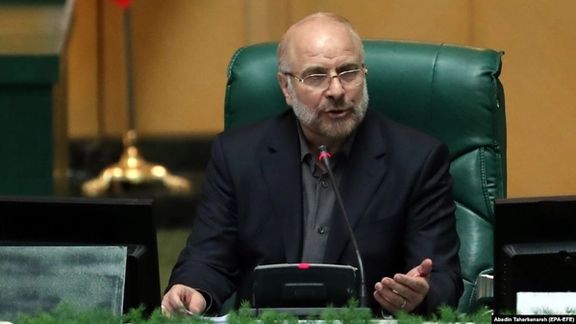Iranian Officials Continue Talking Tough While Delaying Nuclear Talks

The speaker of Iran’s parliament on Monday defending uranium enrichment demanded the lifting of US sanctions “as a first step” to revive the 2015 nuclear deal.

The speaker of Iran’s parliament on Monday defending uranium enrichment demanded the lifting of US sanctions “as a first step” to revive the 2015 nuclear deal.
Mohammad Bagher Ghalibaf said the US should lift its ‘maximum pressure’ on Iran and referred to Tehran’s uranium enrichment effort as something mandated by legislation tied to the removal of US sanctions.
Meanwhile, in an interview on Iran's state television Sunday evening, Hossein Shariatmadari, the editor of Kayhan newspaper, which is close to Supreme Leader Ali Khamenei's office, likened the disputed 2015 nuclear deal with world powers to "a stinking dead body Iran should get rid of at once."
The statement by the influential editor who often echoes Khamenei's ideas may indicate that although the Supreme Leader has effectively consolidated his hardliner control by having Ebrahim Raisi, a like-minded protégé as president, more hardliner supporters are still showing defiance, a tool Tehran often uses to gain leverage.
Iran engaged in six rounds of talks with the West form April to June over reviving the Joint Comprehensive Plan of Action (JCPOA), until Tehran stopped attending. Shariatmadari reiterated that Iran will not gain anything by returning to the JCPOA.
Shariatmadari claimed that "This is no negotiation," citing Iran's security chief Ali Shamkhani as saying that that "the US side is suggesting lifting only some of the sanctions imposed by the Trump administration."
The remarks by Shariatmadari are made against a backdrop of statements by other Iranian officials. One of these statements was made by nuclear chief Mohammad Eslami who insisted that Iran is continuing 20 percent uranium enrichment and has stockpiled over 120 Kilograms of enriched uranium. Despite its defiant appearance, the statement may indicate that Iran is doing so only to have a bargaining chip during the talks.
Last week, moderate newspaper Et'tela'at in Tehran challenged a statement made by the Minister of Economy Ehsan Khandouzi who had said: "In order to control inflation we need to increase oil sales, find access to the country's frozen assets abroad and stop borrowing money from the Central Bank." The daily and several Iranians who commented on social media reminded the minister of the importance of negotiations with the United States and said that Khandouzi should explain how these goals can be attained while the sanctions are still in place."
A highly educated man, the Minister of Economy probably knew the answer, but he let the newspaper and social media users raise the point as it was not in his interest to say in a straightforward way that Iran needs to start negotiations urgently.
Foreign Minister Hossein Amir-Abdollahian's has repeatedly said that Iran is prepared to return to the talks soon. He has also said releasing Iran's assets in South Korea might help facilitate the resumption of the talks, giving a clue to the Americans about where to start.
Iranian commentator and foreign policy analyst Rahman Ghahremanpour observed in a tweet that Amir-Abdollahian “is in a difficult position. On the one hand, he needs to keep the people hopeful in the revival of the JCPOA, and on the other hand, he has to pretend that the situation has changed with the coming to power of the Raisi administration and Iran's positions have toughened. Striking a balance between the two is a very difficult task, particularly at the beginning of his career as foreign minister."